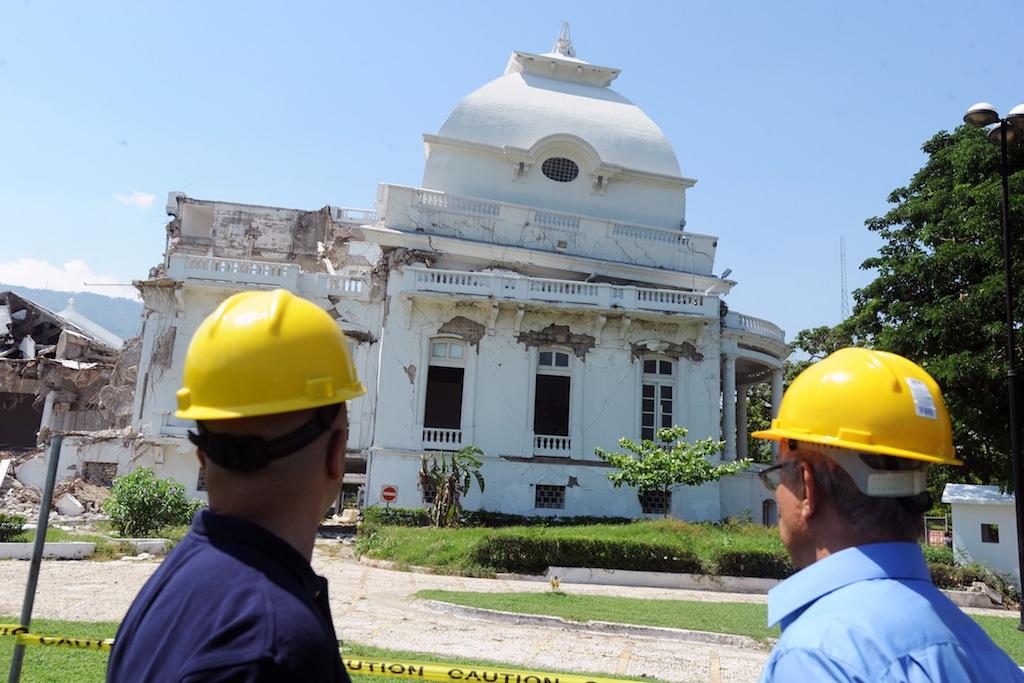Haiti’s National Palace comes down, locals wonder what’s next
Workers stand in front of the condemned National Palace, on September 7, 2012 in Port-au-Prince. Demolition of the building is now underway.
Sean Penn's aid foundation, J/P HRO, began tearing down the once-picturesque National Palace in Port-au-Prince, clearing the most iconic pile of rubble that has remained since the 2010 earthquake.
On Thursday, bulldozers and work crews descended on the former government building, beginning a project that is likely to go on for at least three months, the Associated Press reported last week.
Penn's group reportedly volunteered for the task of demolishing the former presidential residence (President Michel Martelly is now living in a suburb), but there's no word yet on what might be erected in its place, as the Martelly administration has yet to announce plans for a new building. J/P HRO will also be recycling the rubble from the Palace to Cite Soleil, a neighborhood in Port-au-Prince where pieces of the demolished building will be used to repair roads, homes and schools, according to the Caribbean Journal.
Yet some locals are skeptical, wondering why the job went to a foreign organization and not Haitians who are ready and willing to work on what the Miami Herald called "the most powerful symbol of the Haitian state and presidency."
More from GlobalPost: Driving Haiti’s recovery by spending aid dollars locally
“Sean Penn tearing down the National Palace is a reflection of Haiti’s vanishing sovereignty,” said Daly Valet, editor of the Haitian Le Matin newspaper, to the Herald. “The Haitian people have lost control over their destiny. If the international community and their NGOs have succeeded in one thing in Haiti, it is making Haiti anything but a real country with a respectable state.”
Many Haitians, such as political blogger Jean-Junior Joseph, have said that the Haitian government should have been involved in the demolition, using aid money and the strengths of various agencies, such as the Public Works Department or the Center for National Equipment, which volunteered for the job immediately following the earthquake.
However, using government funds would undoubtedly burden the taxpayer and would more than likely exceed any budget set for the project. J/P HRO has begun the demolition at no cost to the Haitian people, according to government spokesperson Damian Merlo, but that seems to hardly make a difference to those who feel their country has been manhandled by foreign aid organizations.
More from GlobalPost: Haiti: A viable tourist destination?
“It is a sorry state of a nation that today says the symbol of the reconstruction of the country should not be in the hands of prominent Haitian architects and engineers, who themselves have been recognized by the international community,” said Former Tourism Minister and architect Patrick Delatour to the Jamaica Observer.
“This particular government does not seem to have any trust or confidence in the ability of Haitian artists, professionals and institutions to steer the reconstruction of the country,” Delatour said to the Herald. “The logic from them being, the different professionals and institutions that participated in governing the country for the past 25 years have failed and have not managed to deliver any product. That is a very shortsighted view of what has been done.”
In 2011, the United States constructed and donated a temporary parliament building, meant to be a stand-in for the one that got destroyed in the earthquake. However, GlobalPost's Jacob Kushner reported that four months later, the building remained vacant and that Haitians were left to finish renovations to the tune of over $700,000, yet another sign that foreign projects that don't take Haitians into consideration are more trouble than they're worth.
The Observer reported that a Dominican firm has been tapped to design and construct a new parliament building, while a Taiwanese company will build the offices for government ministries. However, the Martelly administration has not confirmed these plans.
For more of GlobalPost's coverage of Haiti's recovery, check out our Special Report "Fault Line: Aid, Politics and Blame in Post-Quake Haiti."
The story you just read is accessible and free to all because thousands of listeners and readers contribute to our nonprofit newsroom. We go deep to bring you the human-centered international reporting that you know you can trust. To do this work and to do it well, we rely on the support of our listeners. If you appreciated our coverage this year, if there was a story that made you pause or a song that moved you, would you consider making a gift to sustain our work through 2024 and beyond?
